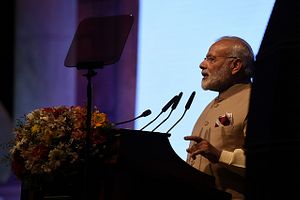Sri Lanka is facing a humanitarian crisis as a consequence of the nation’s worst torrential rains since 2003. The rains have displaced nearly half a million people and led to more than 200 deaths. The Modi government was quick to react. Indian Prime Minister Narendra Modi not only expressed his condolences over the loss of life and property in Sri Lanka but also promptly dispatched relief material to Colombo. The Indian Navy deployed three ships and more than 300 personnel to assist Sri Lanka in rescue and relief efforts; other nations have come to aid Colombo as well.
The Modi government has been an enthusiastic supporter of the Sirisena government and has enhanced cooperation with Colombo at all levels over the last three years. Modi traveled to Sri Lanka in May to participate in celebrations marking Vesak Day, which commemorates Buddha’s birth, enlightenment, and passing away. “Buddhism and its various strands are deep seated in our governance, culture and philosophy,” Modi said, bringing to the fore the underlying bonds between the two neighboring states.
This was Modi’s second trip to the island nation since assuming office in May 2014 and underscored his commitment to enhancing this relationship. He reached out to Indian Tamils by visiting Dickoya in the island’s central hills, where Tamil people of Indian origin are concentrated. Modi became the first Indian prime minister to reach out to the roughly 30,000 Indian Tamils in the Central Province of Sri Lanka. This new focus of Indian diplomacy was made clear when Foreign Secretary S. Jaishanker visited the island in February, suggesting that India “will henceforth” give “special consideration” to Indian Tamils in view of their special needs and their willingness to join the island’s political mainstream.
Modi has deftly used cultural ties to enhance India’s engagement with Sri Lanka, especially at a time when China’s imprint on the island nation has been growing. Some results of Modi’s proactive outreach are already evident. Days before Modi’s May visit, Sri Lanka turned down China’s request to dock one of its submarines in Hambantota port so as not to upset India. This is a sharp contrast to the past, when Chinese submarines have been allowed to be docked in Sri Lankan waters despite Indian protests. India and Sri Lanka have signed a memorandum of understanding for enhancing economic cooperation in projects covering several sectors like power, infrastructure, and agriculture.
New Delhi’s outreach to Mauritius also gathered momentum in May when Mauritian Prime Minister Praveen Kumar Jugnauth visited India. His visit saw the signing of four pacts between the two nations, including one whereby India offered unconditional cooperation in the key area of maritime security in the Indian Ocean region. During his visit to Mauritius in March 2015, Modi commissioned the offshore patrol vessel (OPV) Barracuda, built and financed by India, into the Mauritian Coast Guard.
“Our partnership with Mauritius is among our strongest maritime relationships in the world… We will also train and patrol the seas together,” Modi said during a visit to the island nation in 2015. India also announced a $500 million line of credit to Mauritius as an example of the strong and continuing commitment of New Delhi to the development of that country. Jugnauth also stressed the cultural ties that bind the two nations together. Mauritius is home to a large number of people of Indian origin who are descendants of indentured Indian workers brought in the 19th century to work in sugarcane plantations.
The Modi government has been paying special attention to developing ties with India’s neighbors in the Indian Ocean region. It is starting to take up its role as a regional security provider seriously and so the engagements with its maritime neighbors are getting stronger by the day. Modi has argued that the “Indian Ocean Region is at the top of our policy priorities. Our vision for Indian Ocean Region is rooted in advancing cooperation in our region; and, to use our capabilities for the benefit of all in our common maritime home… Those who live in this region have the primary responsibility for peace, stability, and prosperity in the Indian Ocean.”
As China’s economic juggernaut continues to roll against the backdrop of the Belt and Road Initiative, it is more important than ever for India to build durable partnerships with the island nations in the region. Its recent outreach to Sri Lanka and Mauritius suggests that it is taking the challenge head on.

































